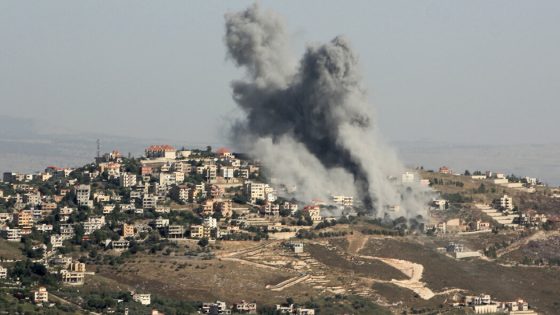Hezbollah said on Tuesday that Israeli forces had killed one of its commanders in a strike in southern Lebanon, stoking concerns about an escalation of the conflict on another Israeli front.
In response, Hezbollah fired one of its heaviest rocket barrages yet into Israel on Wednesday, targeting military bases and arms factories.
The commander, Taleb Abdallah, also known as Abu Taleb, was among the highest-ranking Hezbollah fighters in Lebanon to have been killed in the eight-month-long conflict, according to a senior Lebanese intelligence official, who spoke on condition of anonymity to discuss the sensitive issue.
In an apparent nod to Mr. Abdallah’s seniority, Hezbollah made the rare move of releasing a photo of him alongside Wissam Hassan al-Tawil, a high-ranking commander in the group’s Radwan unit, who was killed in a strike in January.
The Israeli strike in the southern Lebanese village of Jouya late Tuesday killed three other Hezbollah fighters alongside Mr. Abdallah, the Lebanese official said. The Israeli military did not immediately comment on the strike.
Israeli army radio said on Wednesday that around 150 rockets had been launched into northern Israel in an apparent response, with Hezbollah claiming attacks on a string of military bases, including on Mount Meron, an area housing a military radar station that is roughly five miles south of the Israeli-Lebanese border.
Hezbollah also claimed to have struck an arms factory belonging to Plasan, a manufacturer of armored vehicles used by the Israeli military. There were no immediate reports of casualties, according to the Israeli military.
Hezbollah, a powerful Lebanese militia and political movement backed by Iran, and Israel have bombarded each other across the border for much of the past eight months, with more than 150,000 people on both sides of the boundary forced to flee their homes. But the intensity of the attacks has increased this month amid threats by Israeli officials at the highest levels to pursue further military action.
Israel has been targeting Hezbollah commanders with the aim of pushing the group north of the Litani River in Lebanon, hoping to prevent cross-border attacks and to eventually allow Israeli civilians displaced by the fighting to return to their homes. Some experts have expressed skepticism about whether the targeted killings can accomplish this aim.
Last week, during a visit to northern Israel after a barrage of Hezbollah rockets set off wildfires that blazed for days, Prime Minister Benjamin Netanyahu issued a threat of “very intense action” to “restore security to the north.”
In a sign of the heightening conflict, Israel this week struck deeper into Lebanon than it had since the war in Gaza began, targeting an area along the country’s northeastern border with Syria.
“Whoever thinks he can hurt us and we will respond by sitting on our hands is making a big mistake,” Mr. Netanyahu said, according to the Israeli government.
In recent weeks, Hezbollah for the first time has begun targeting Israel’s vaunted Iron Dome missile-defense system.
Answering calls by Hamas to open a second front a day after its deadly assault on Israel, Hezbollah launched attacks into Israel on Oct. 8. Hezbollah’s leader, Hassan Nasrallah, has said that his group is trying to pin Israel’s troops along the border and limit its capacity to attack Hamas in Gaza.
Hezbollah says that more than 300 fighters have been killed in the most recent round of fighting with Israel. The United Nations says that about 80 Lebanese civilians have died. In Israel, the authorities say that 19 security personnel and at least eight civilians have been killed.
Euan Ward and Matthew Mpoke Bigg contributed reporting.
Source Agencies


